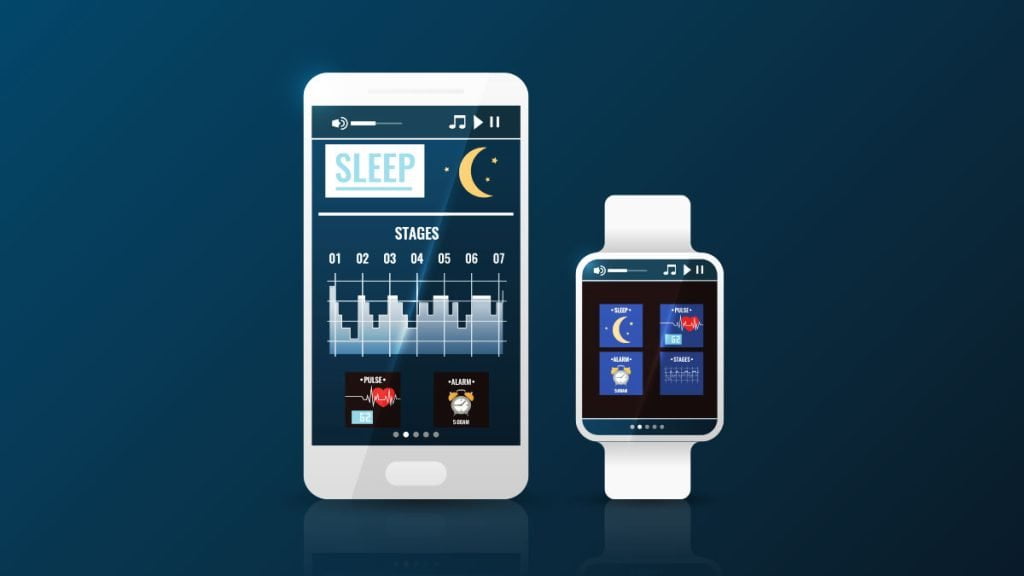
Smartwatches, apps and wearables are everywhere – but can they improve your sleep? What about other sleep tech? What works and what doesn’t? We all want a great night’s sleep, but some “solutions” cause more stress than shut-eye. We look at the options, including the pros and cons.
Features vary from tracker to tracker, but most of them focus on two similar functions:
Some devices may track your sleep cycles, which allows you to set an alarm during the lightest phase of sleep in the morning. The most advanced types of trackers may even record environmental factors, such as how much light you have in your bedroom and your room temperature. Some sophisticated trackers allow you to input your lifestyle behaviours that might influence your sleep quality, including the amount of caffeine or alcohol you’ve consumed, when you’ve eaten and how stressed you are.
Some trackers are wearable devices, many of which are worn like watches. Some wearable sleep trackers come in the form of a ring you slip on your finger at bedtime to gather data or as a sensor-loaded headband. There are even ‘smart pyjamas’ available now, designed with patches wired up to one another to gather data on heart-rate, breathing and posture.
If you don’t want to wear a tracker, you can investigate the app options. Free apps (like Sleep Cycle) downloaded to your smartphone, are good options to start with.
However, sleep trackers come with both pros and cons. Martin Reed, a certified clinical sleep health educator and the founder of insomniacoach.com, often treats people who suffer with insomnia. “If someone has chronic insomnia, sleep tracking devices can be unhelpful since they often bring more focus and attention on sleep and risk increasing sleep-related worry and anxiety – all things that can make sleep more difficult.”
Reed is also concerned about the accuracy of sleep trackers, especially for insomniacs. It takes work to establish better sleep habits, which he believes should be the real focus. “Ultimately, the key to better sleep for people with chronic insomnia is to tackle the thoughts and behaviours that perpetuate sleep disruption,” he explains. “This includes sleep effort, ongoing sleep-related research and sleep-related thoughts and worries.” He also points out that his clients with chronic insomnia often report how much better they feel when they stop using a sleep tracking device.
“Ultimately, when it comes to sleep, all that really matters is how you feel,” Reed says. “If you feel refreshed after a night of sleep and can get through the day, it’s likely that you’re sleeping just fine. If you’re tempted to put more effort into sleep or make a conscious effort to improve your sleep, this can lead to sleep disruption since sleep cannot be controlled.”
You’ve heard of night lights for children who are scared of the dark, but have you heard of wake-up lights? Also known as sunrise alarms, they are designed to mimic a natural sunrise to help your body emerge more naturally from deeper sleep phases (as opposed to shocking it awake with an alarm sound). A wake-up light turns on roughly half an hour before your sound alarm is meant to go off, slowly brightening your room and then chiming in with a sound alarm. Wake-up alarms come with a range of features, with some even including sunset-style bedtime modes to soothe you to sleep with gentle sounds, guided meditation or breathing exercises.
Our circadian systems are closed tuned to light, which is why it helps sleep to block out blue light from electronics before bedtime. The Sleep Foundation says that wake-up lights can be a more natural alternative to traditional alarms. Read reviews on the particular option you’re considering to ensure it will meet your needs and expectations.
Relaxation apps can help to calm your body down, slow your heart-rate and signal to your body that it’s time to sleep. Meditation apps and breathing exercises can be extremely effective. One popular app (which is also accessible in your web browser, is Headspace. The aim of tis to make the benefits of meditation accessible, anytime, anywhere. Used by people in 190 countries around the world, Headspace is a well-reviewed option that also offers a free trial.
Another helpful tool is white noise, which can block out distracting background sounds and provide a soothing soundtrack to sleep to. White noise can be a bit dull, but apps like Noisli offer a range of soothing options, from wind to the crackling of a bonfire or seaside sounds. You can create your own combination (also a useful took for replicating a coffee shop buzz while working from home).
Not all technology has to be electronic! At Restonic SA, we might be a bit biased, but we firmly believe that the best investment in your sleep is your mattress. Our mattress technology is designed to give you a good night’s rest, for years of your life.
For example, our Marvelous Middle® technology gives you extra support where you need it in the bed, to avoid sagging and protect your posture while sleeping. Read more about it here.
For more fun sleep facts and expert sleep advice, visit our Sleep Blog.